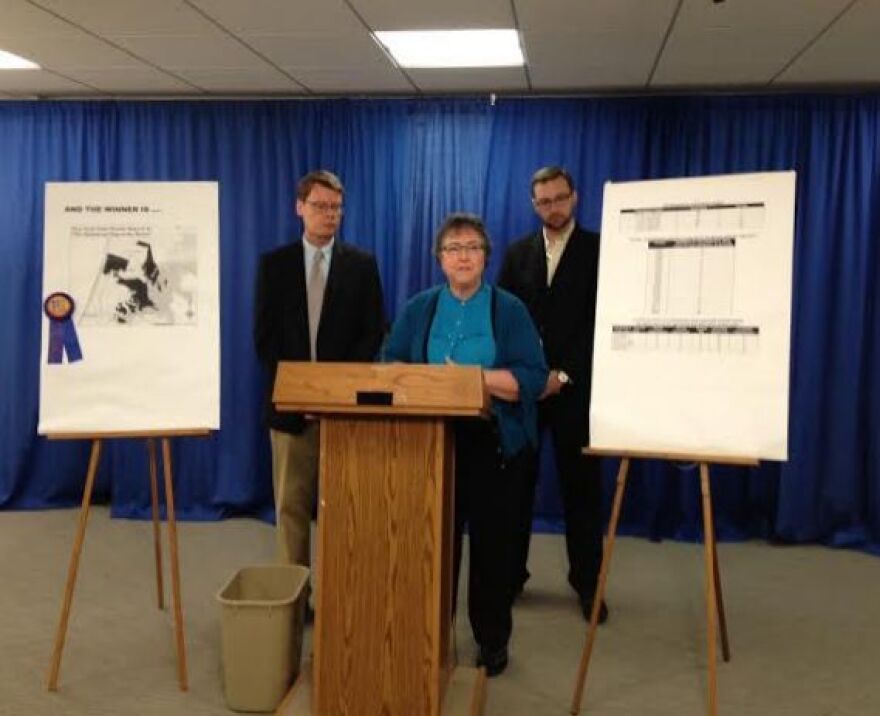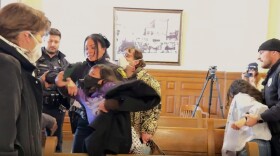Government reform groups are split over whether an amendment on the November ballot to change the way legislative district lines are drawn is an improvement, or will only make gerrymandering worse.
On November 4, voters in New York will decide whether they want to amend the state’s constitution to change the way Senate and Assembly lines are drawn.
Currently, the majority parties in each house draw the lines to help their members remain in power, in what critics say is blatant gerrymandering of districts that have earned the nick names like the ink blot district, the Long Island crocodile and the Buffalo bender.
Dick Dadey, with Citizens Union, says the amendment helps to end that.
“Given the horrible practice that we have right now of self interested legislators drawing their own lines, this amendment is a huge improvement,” Dadey said.
The amendment would create a new commission to draw the lines. Each of the four majority and minority party legislative leaders get to pick two members of the commission, for a total of eight. Two others would then be then chosen by the appointed commissioners. The two extra members cannot be affiliated with either the Democratic or Republican parties. The commission would have to stick some established principles of fairness when drawing the districts. The State Board of Elections recently approved the specific ballot language that voters will see, and added the characterization of the commission as “independent” Dadey says it will “remove the partisan scheming”.
Dadey’s group is teaming up with the League of Women Voters this fall to urge a yes vote on the ballot item.
But two other major reform groups, Common Cause and the New York Public Interest Research Group, believe the commission would not be independent and that the change would only enshrine political gerrymandering into the state’s constitution.
NYPIRG’s Blair Horner says the commission can’t be truly independent because legislative leaders still get to choose 80% of the commissioners. And he says the amendment gives the legislature an out, if it doesn’t like the new district lines that the commission draws. If the Senate and Assembly twice vote to reject the new lines, then the legislature would regain the power to redraw the lines.
“Is this independent panel?” Horner asked. “We argue no. They’re puppets and the legislature is still the puppeteer.”
Dadey, with Citizens Union, calls that argument a “red herring”. He says even if that scenario occurred and the legislature did reject the commission’s plans twice and ultimately draw its own lines, legislative leaders would still have to follow the new fairness principles that would not permit any favors for incumbents or political parties, and would protect what’s known as communities of interest.
Horner, with NYPIRG says similar protections already exist in the current constitutional language, but are routinely ignored. And he says, the changes would not allow for a complete redrawing of the lines, to correct some of the most oddly gerrymandered districts. The commission could not change an existing district’s make up by more than 2%.
“By advancing this proposal, it’s a way to take the wind out of the sails of reformers,” Horner said.
Dadey says that the redistricting ballot amendment is a compromise. He says you can’t completely scrub politics out of the equation.
“Citizens Union never lets the perfect be the enemy of the good,” Dadey said. “We see reform as an incremental process. You can’t get everything you always want all at once.”
Dadey believes the change to the state’s constitution could also give reformers new legal ammunition, if the legislature did try to return to its old habits and draw lines to benefit the majority political party in each house. He says the state of Florida in 2010 passed similar legislation to New York’s proposed constitutional changes. When it appeared that the new congressional lines were still gerrymandered, the Florida League of Women Voters and others took the matter to court. A judge agreed that the lines were not drawn fairly, and Florida lawmakers have been scrambling to redo them ever since.








